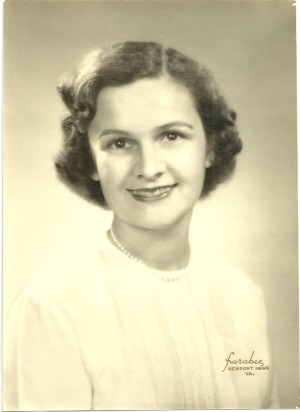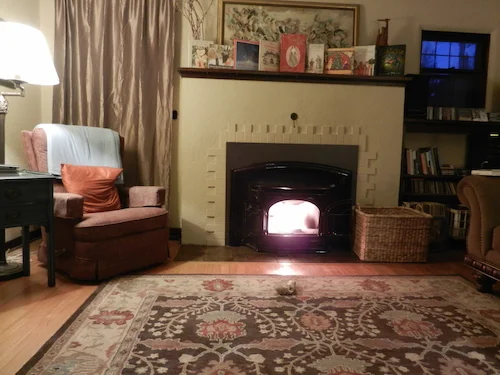 This past August, after months of gradual decline, my grandmother passed away.
This past August, after months of gradual decline, my grandmother passed away.
In the days leading up to Doll’s death, when I knew she was in the in-between, I broke down with increasing regularity — while driving, making pancakes, standing in the middle of the backyard watching my children play, and reading bedtime stories. I would think that I’d gotten it all out of my system and then I’d remember the twinkly sound of her voice, how there was always laughter and loveliness on the other side of it, and I would start crying — big, hiccupping, little girl tears — all over again.
My children, who are usually the ones crying on a regular basis, didn’t quite know what to do with me. And in light of Doll’s long, comfortable life and my rational acceptance of her inevitable death, the depth of my grief surprised even me. By mid-August, at almost 94 years old, Doll was becoming less and less lucid and was mostly confined to her bed. If her kidneys weren’t failing, her heart was. It was time. But I wasn’t ready.
Although there wasn’t anything strikingly unusual about her, I always thought of Doll as different from stereotypical grandmothers. She was youngish — having had my mother at 20 — and she busied herself with creating beautiful things: growing and arranging blue-ribbon roses, knitting, needlepoint, and hosting parties that were always filled with her happy, gracious warmth. Doll had a difficult childhood — something she never talked about, but she turned what could have been bitterness into gratitude, and that made her a joy to be around.
Every summer, we spent two weeks with my grandparents in the middle neck of Virginia, a seven-hour trip from where I grew up. Being there was the epitome of freedom — my sister and I were expected to be respectful, and to try to be quiet in church, but other than that, just about all of our requests were answered with a “yes.” Doll and I took turns doing each other’s nails. She allowed me to paw through her jewelry and try on every piece, saved chicken gizzards in the freezer so we could go crabbing, and let us stay up late to watch The Love Boat with my grandfather. We ate hotcakes in the shape of gingerbread men, apricot ice, crab casserole, and oysters. Doll was a mean opponent at double solitaire, but I could beat her at Scrabble, and although there was no skill to it, we were fierce competitors at the card game called war. One summer, when it was time to leave and I couldn’t stop crying, she taught me how to shuffle a deck of cards. I practiced all the way home.
This summer when I couldn’t stop crying, I thought about shuffling cards, and what it’s like to be offered kindness unclouded by expectations. As a parent, I’m no Tiger Mom. We’re not up practicing anything at the crack of dawn. I don’t hammer my six-year-old with sight words every night. I allow my three kids to have sweets and enjoy television and, on occasion, fun little surprises. But I do have expectations of my children that, as I’ve mourned a grandmother who allowed me, so beautifully, just “to be,” I would like to discard. Of all the gifts Doll gave me, I think it was her wholly affectionate acceptance and respect of me that I treasure the most, and that’s what fueled my summer heartbreak, past and present.
My family and I paid a visit to Doll this past spring, and honestly, I dreaded the trip. She’d been very ill, and I knew this would be my last chance to see her. After so many years of making wonderful memories, I hated to think of seeing her as the more vulnerable one, or to encounter her home as a makeshift hospital — the dining room that had once served as the hub for so many lovely parties converted as storage for her caregivers’ things; her room outfitted with a hospital bed in the corner while a nurse slept where she used to, in the bed I once sneaked into for 5 am cuddles, eager to start my summer days.
But to my surprise, Doll filled the visit with her perennial loveliness. She had moments of forgetting whether she’d introduced me to her caregiver for the day, but overall, she was both delighted and delightful. Her sense of hospitality undimmed, she was fully present with us, fully engaged with my children, and content to sit and hold my hand, because, perhaps, she knew that that is what I needed the most.
In August, a few days before she slipped away, I called her. I’d expected to speak with Carolyn or Annie or Violet, one of her faithful nurses, just to let Doll know I was thinking of her, but she was awake. When she came on the line, her voice had the same old shimmer, as if she’d just walked in from tending her roses and was so pleased she hadn’t missed my call. I don’t remember much of what she said, except that all my crying was going to make her cry, and that it was so nice not to have to say much at all — because we already knew everything we needed to know.
When arrangements had been made for the funeral, I made hasty travel and childcare plans. In the process, people learned that my grandmother had died, and they offered condolences that were certainly heartfelt, but no match for what I was feeling. I’d done the same thing. Upon finding out that a friend had lost an elderly loved one, or even an old, beloved pet, I would say “Oh, I’m so sorry,” in passing — meaning it, but also knowing that it was supposed to happen, and therefore failing to care too much. The ability to anticipate those last, sweet breaths is no contest for all that came before.
One summer, when my grandparents had had some guests drop in, I was in the kitchen helping Doll, and I overfilled some glasses with Tab. I was only eight or nine at the time, and I looked to her for what to do. If I moved the glasses, they’d spill and make a mess. “Just sip them down,” she said, with a twinkle in her eye. “They’ll never know.” So I did, and we carried them out to the porch like nothing at all had happened, holding that little moment between us, like friends.
For some reason, as I’ve been traveling along the other side of grief, I’ve been returning to that memory in particular. It may be because that exchange was so funny to me then, or because it felt special in a different way than others. But I think it’s also because I’m finding that so much of what Doll taught me had to do with working around missteps — my own, and others’ — with flexibility and grace. And, posthumously, that she’s redefined the meaning of hospitality for me, so that I think of it not only in its traditional sense, but also in the day-to-day as I “host” my children, their friends, my husband, and our friends and family. Doll cared for and catered to her guests. She hoped to spoil them with the best of what she had to offer — a thing that, when translated, came down to great love and a capacity to supply equal amounts of comfort and whimsy. She expected little, if anything, in return, which meant that friends regularly left homegrown vegetables on her stoop, that her Greek seamstress made her homemade baklava, and that my grandfather spent more of his hard-earned money on jewelry than he ever intended.
When my flight touched down in Norfolk during the week of her funeral, I wondered whether or not I’d be met by high tide when we drove up the lane to my grandparents’ house. They lived on a little inlet called Put-In Creek, because it’s where everyone would put their boats in the water, and whenever Doll had guests coming for a visit, she always desperately hoped for them to arrive at high tide. The muddy banks, littered with rough oyster shells and thick with reeds, were no match for the water’s majesty, and although I certainly didn’t care, I knew she would.
When we got there, the tide was high. The light was just right, and the air was humid and heavy and buzzing with the sounds of my childhood. My grandmother, whose heart seemed always to rise up from an unexpected place and fill the room with her loveliness, wasn’t there, but yet, of course, she was; and in the midst of all that beautiful stuff — the smell of salt, the glinting water, the pine needles underfoot, and an overwhelming sense of gratitude — my heart, somehow, stopped breaking.
Towles Kintz serves as an editor for Proximity, an online literary journal, and keeps a little blog called The Interior Life. She lives in Nashville, Tennessee, with her family.
















